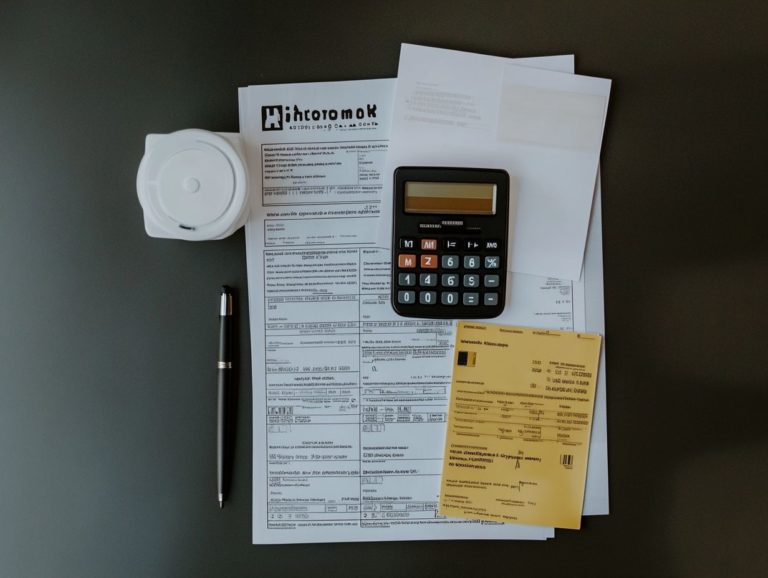Tax Benefits of Incorporating Your Freelance Business
Incorporating your freelance business can be a transformative move, presenting you with potential tax benefits and legal protections that a sole proprietorship simply can t provide. This allows for enhanced asset protection and business flexibility.
This article delves into the advantages of incorporation, highlighting lower tax rates, valuable deductions, and the concept of a tax method where business profits are taxed as personal income, which is particularly beneficial for freelancers. It also compares various business structures such as LLCs and corporations ensuring you have the information necessary to make an informed choice.
It outlines the steps required for incorporation and discusses the ongoing obligations that come with it.
Ready to take your freelance career to the next level? Let s jump in!
Contents
- Key Takeaways:
- Tax Benefits of Incorporation
- Types of Business Structures for Freelancers
- Steps to Incorporate Your Freelance Business
- Maintaining Your Incorporated Freelance Business
- Frequently Asked Questions
- What are the tax benefits of incorporating my freelance business?
- How does incorporating my freelance business reduce self-employment taxes?
- What business expenses can I deduct as an incorporated freelancer?
- Are there any tax deductions or credits specifically for incorporated businesses?
- Do I need to incorporate my freelance business to take advantage of tax benefits?
- How do I incorporate my freelance business?
Key Takeaways:

- Incorporating your freelance business can result in lower tax rates and increased deductions, providing potential financial benefits for your business.
- Pass-through taxation is a key tax benefit of incorporating, allowing you to only pay taxes on your individual income, rather than on the business’s profits.
- There are various types of business structures available for freelancers, including sole proprietorship, LLC, and corporation, each with unique tax implications and benefits.
What is Incorporation and Why Should Freelancers Consider It?
Incorporation is your pathway to forming a legal entity that stands apart from you as an individual, offering a structured business framework. This process enables you to limit personal liability, unlock tax benefits, and enhance your business credibility.
By choosing to incorporate, you can explore various structures like LLCs, S corporations, and C corporations, each presenting its unique advantages and growth opportunities. Understanding these complexities gives you the power to make informed decisions that protect your personal assets while optimizing your business operations.
Through incorporation, you gain a sense of legitimacy, cultivating a professional image that attracts more clients. Limited Liability Companies (LLCs) are especially attractive because of their flexibility; they provide protection from personal debts while allowing for pass-through taxation.
Conversely, corporations may offer additional perks, such as the ability to raise capital through stock sales and potential tax advantages.
Your decision to incorporate should align with your personal circumstances and long-term goals, as it significantly influences not just your financial stability but also the credibility and longevity of your business in a competitive market.
Tax Benefits of Incorporation
Incorporating your business presents a host of tax benefits that can elevate your financial strategy as a freelancer. This approach enables you to deduct a broader array of business expenses while also unlocking opportunities for substantial tax savings through retirement plans and health insurance discounts.
Embracing incorporation not only optimizes your tax situation but also enhances your overall financial well-being.
Lower Tax Rates and Deductions
One of the primary advantages of incorporation for freelancers lies in the potential for lower tax rates and the ability to deduct various business expenses, leading to substantial financial savings.
By opting to operate as an LLC, S corporation, or C corporation, you can unlock a range of tax benefits that sole proprietors simply don t have access to. This choice helps lower your taxable income. You can deduct business-related costs like office supplies, travel expenses, and even a portion of your home office.
Understanding the nuances of these different corporate structures gives you the power to craft tailored tax strategies that optimize your financial outcomes. Engaging in thorough tax preparation and grasping the intricacies of business operations can further amplify these advantages, ensuring that you re maximizing your eligible deductions and minimizing your tax liabilities.
Don t miss out on potential savings discover the benefits of incorporation now!
Pass-Through Taxation

Pass-through taxation is vital for certain business structures like LLCs and S corporations. Your business income is reported on your personal tax returns, sidestepping the dreaded double taxation.
This method allows profits to flow directly to you. You pay personal income tax rates instead of corporate tax rates.
It simplifies your tax obligations and makes life easier. Sole proprietorships and partnerships also benefit from this approach, streamlining financial reporting.
The implications are significant: you could enjoy lower overall tax liabilities and greater financial flexibility. However, personal liability isn’t fully protected, especially outside formal structures.
Self-employment taxes apply when you earn money from freelance work, helping fund Social Security and Medicare. You’ll need thorough financial planning to maximize these potential benefits.
Types of Business Structures for Freelancers
As a freelancer, you have various business structures available. Each offers unique advantages in terms of liability protection, tax implications, and operational flexibility.
You can choose from sole proprietorships, LLCs, S corporations, and C corporations. Tailor your approach to suit your needs and goals.
Comparison of Sole Proprietorship, LLC, and Corporation
When considering sole proprietorships, LLCs, and corporations, think about personal liability and tax benefits. Each structure has unique advantages and challenges that influence your business.
A sole proprietorship is often the simplest and most cost-effective route. You maintain complete control and enjoy straightforward tax reporting.
However, it poses the risk of unlimited personal liability, meaning your personal assets could be at risk in a lawsuit.
On the other hand, a Limited Liability Company (LLC) provides vital protection against personal liability. It allows for pass-through taxation, enabling you to report business income on your personal tax returns.
While corporations have more complex administrative requirements, they offer additional tax advantages and limited liability protection. This makes them appealing if you aim to scale your business.
Steps to Incorporate Your Freelance Business
Incorporating your freelance business involves critical steps that lay the groundwork for your success. Start by understanding the legal requirements specific to your industry.
Next, secure an Employer Identification Number (EIN). This number is essential for tax purposes and establishing your business identity.
Finally, open a dedicated business bank account. This helps separate your personal and business finances, ensuring clarity and professionalism in your financial management.
Legal Requirements and Process

Understanding the legal requirements and the incorporation process is essential for freelancers. You’ll need to obtain an Employer Identification Number (EIN), a unique number assigned by the IRS for tax purposes, secure necessary permits and licenses, and draft corporate bylaws to govern your business.
Understanding these legal matters protects your interests and lays a strong foundation for operations. Your first step is to secure that EIN through the IRS, which serves as your business’s tax ID.
Depending on your services, you may need various local and state permits to comply with industry regulations. Crafting corporate bylaws is essential; they outline the internal governance of your business.
By adhering to these legal requirements, you safeguard your venture. This fosters growth while minimizing the risk of legal complications.
Maintaining Your Incorporated Freelance Business
Once you incorporate, stay on top of your ongoing legal obligations. This means keeping accurate corporate records, fulfilling tax preparation requirements, and securing the right business insurance to mitigate potential risks.
Ongoing Legal and Tax Obligations
As a freelancer who has incorporated, it’s vital to remain vigilant about your legal and tax obligations. Timely tax preparation and maintaining accurate corporate records ensure compliance with state and federal regulations.
Being diligent protects you from penalties and preserves the corporate veil, keeping your personal and business liabilities separate. Adhere to various reporting requirements and tax obligations set by the IRS.
Keep meticulous records of income and expenses, including minutes from corporate meetings. By staying organized, you can focus on your craft while meeting all legal and financial guidelines.
Frequently Asked Questions
What are the tax benefits of incorporating my freelance business?

Incorporating your freelance business can provide several tax benefits. These include reducing your self-employment tax burden and allowing you to deduct business expenses like office space and permits.
How does incorporating my freelance business reduce self-employment taxes?
When you incorporate, you become an employee of your company. This means you only pay self-employment taxes on your salary, not on all your business income.
What business expenses can I deduct as an incorporated freelancer?
You can deduct a wide range of expenses, such as office supplies, marketing costs, and travel expenses. These deductions can lower your taxable income and save you money on taxes.
Are there any tax deductions or credits specifically for incorporated businesses?
Yes, there are certain deductions and credits only available to incorporated businesses. These may include education expenses, retirement plan contributions, and credits for hiring certain employees.
Do I need to incorporate my freelance business to take advantage of tax benefits?
No, you do not need to incorporate your freelance business to benefit from tax advantages. Incorporating can provide extra savings and legal protections for your business.
Consult with a tax professional to find the best structure for your situation.
How do I incorporate my freelance business?
The process to register your business varies by location. Typically, you must file articles of incorporation with your state s Secretary of State and obtain necessary licenses.
Seeking help from a lawyer or accountant will ensure you comply with all legal requirements and maximize your benefits.






